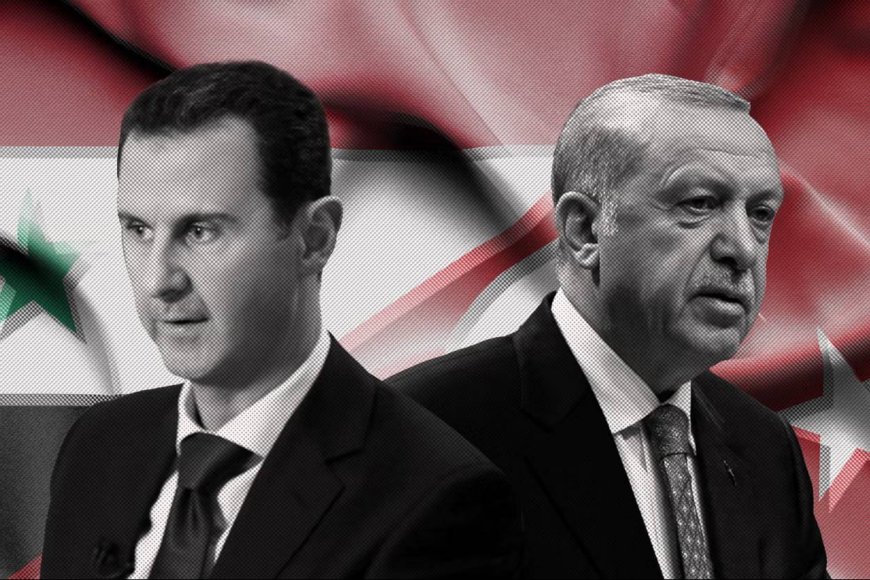The Erosion of Turkish Diplomacy: From Neo-Ottomanism to Regional Pariah

By: M. Sharifi
In recent years, Turkish-Syrian relations have been marked by escalating tensions, culminating in the severance of diplomatic ties. This discord stems primarily from Turkey's military presence and its support for proxy forces controlling regions in northern Syria.
Since 2016, Ankara has launched successive cross-border incursions aimed primarily at expelling the Syrian Democratic Forces (SDF), thereby exacerbating the rift between the two nations.
Despite ongoing disputes, recent developments suggest a burgeoning mutual interest in mending ties. Indicators of this potential normalization include the resumption of diplomatic contacts and positive exchanges between Syrian President Bashar al-Assad and his Turkish counterpart Recep Tayyip Erdoğan.
Ankara's Motive Behind Normalization Efforts
Prior to the emergence of tensions, Turkish-Syrian relations were robust, particularly under the Adana Security Agreement signed in October 1998, which significantly benefited the Turkish economy. However, the Syrian unrest engendered delusions of grand gains for Turkey and the ruling Justice and Development Party (AKP), leading to the reckless pursuit of a "Syria without Assad" policy. This ambition has since collapsed, prompting Ankara to seek renewed cooperation with Damascus. Erdoğan’s personal failure to revive the Ottoman Empire under the "Neo-Ottomanism" banner post-2011 is a crucial factor in this policy shift. Additional factors include the AKP’s defeat in recent municipal elections, the ascendancy of opposition parties, economic turmoil, the continuous depreciation of the Turkish lira, and cultural and social shifts within Turkey.
Regional Mediation Efforts
Russia, acting as a mediator, facilitated intelligence-level communications between Ankara and Damascus in 2021, leading to subsequent meetings between the defense and foreign ministers of both countries. Recently, Alexander Lavrentiev, Russia’s special envoy to Syria, visited Damascus, where President Assad expressed Syria’s readiness to consider initiatives to improve relations with Turkey, contingent upon respect for Syrian sovereignty and a commitment to combating terrorism.
Furthermore, Iraq has emerged as a mediator following Erdoğan’s official visit in April 2024. Having successfully mediated between Saudi Arabia and Iran, as well as between Egypt and Iran, Iraq now aims to replicate this success by fostering peace between Turkey and Syria.
The Path to Diplomatic Reconciliation
President Bashar al-Assad has recently achieved significant diplomatic victories, including Syria’s readmission to the Arab League and the restoration of diplomatic relations with Arab nations. Now, Turkey, a regional heavyweight, seeks to rekindle its relationship with Damascus, with Russia and Iraq facilitating this rapprochement. Assad has welcomed all initiatives to improve Syrian-Turkish relations, provided they respect Syrian sovereignty—a condition previously deemed unacceptable by Turkey but now seemingly relaxed. Syrian Foreign Minister Faisal Mekdad has indicated Syria's willingness to engage diplomatically, provided Turkey offers specific guarantees and takes concrete steps.
Turkey's key condition is addressing the issue of separatist Kurdish forces east of the Euphrates and ensuring their return to Damascus’ control to prevent destabilizing effects in Turkey's Kurdish regions, such as Diyarbakir. Given these conditions, it appears that with mutual determination, the obstacles hindering Syrian-Turkish relations could be overcome, leading to the resumption of amicable relations.
Conclusion
Turkey’s aggressive policies and Erdogan’s failed Neo-Ottoman ambitions have led to regional instability and strained relations with Syria. The ongoing efforts to normalize relations, driven by economic necessity and geopolitical realities, highlight Turkey’s diminishing influence and the shifting dynamics of Middle Eastern politics. The potential restoration of Turkish-Syrian relations, facilitated by Russian and Iraqi mediation, could mark a significant geopolitical shift, but only if Ankara can move beyond its hegemonic aspirations and genuinely respect Syrian sovereignty. The coming years will reveal whether Turkey can navigate this complex diplomatic landscape or continue its descent into regional isolation and irrelevance.













































